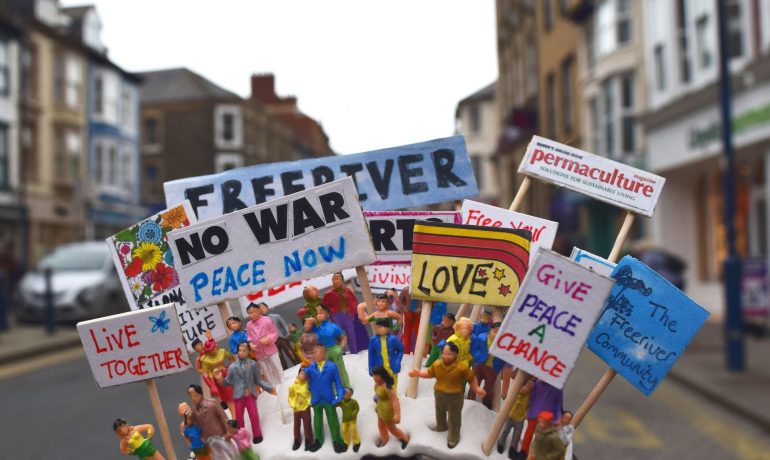In previous posts, we’ve looked at the Environmental impacts of the climate crisis, possible Technological responses and the Economic effects. In this one, we consider the way Social and Political attitudes are changing and consider how they play out in the future. Next time, we’ll also look at Legal and Regulatory issues.
Society does seem to be have become increasingly concerned about the climate crisis in the last couple of years, and it features much more frequently in public debate. Even the language used (“crisis” rather than “change”) has begun to reflect this. Environmental activists may still be in a minority, but their actions are pushing the issue more into the centre of public opinion.
Pressure is increasing in a number of ways:
- School strikes and Greta Thunberg create headlines frequently: “You have stolen my dreams and my childhood with your empty words”
- Extinction Rebellion demonstrations bring the issue directly to the attention of the public; though can create a backlash in some cases
- BP sponsorship of the arts has become challenged by high profile people like Mark Rylance, and other such as the Scottish National Portrait Gallery are also getting involved
- Similarly, Roger Federer is coming under criticism for taking sponsorship from Credit Suisse, a company that finances the fossil fuel industry.
Wider interest in environmental issues (such as air pollution, single-use plastic) is also creating an atmosphere where taking personal action to reduce emissions is more common. A YouGov poll of more than 2,000 people found that 67% agreed that limiting air travel was key to addressing climate change. A total of 53% agreed that reducing the amount of meat consumed as part of everyday diets should be targeted. Veganism – or at least eating less meat – is a distinct trend, supported by commercial interests. The survey also noted that 61% of the public supported the declaration of a “climate emergency” and the setting of a net-zero target.
Support is not universal however – rising fuel prices introduced to reduce emissions were initially the spark of the gilets jaunes demonstrations in France (though the movement has now taken on other issues).
Although technology will support a shift to net-zero targets, many – including Defra’s ex Chief Scientific Advisor – argue that reducing consumption will be necessary to hit the targets early enough. He suggested that the tax system should be used to reward lower carbon activities, and move people away from high polluting ones.
These changes in attitudes are feeding through into the political process. The UK Government has passed into law the requirement to reach net-zero carbon emissions by 2050 – though many argue this is not sufficient. All major party manifestoes at the UK 2019 General Election included commitments to tree planting and other actions to hit the target.
The EU has also set out its climate goals. The new President of the European Commission, Ursula von der Leyen, has put climate change at the top of her agenda. She pledged to strengthen the EU’s short-term goal on greenhouse-gas emissions from a 40% reduction by 2030 to at least a 50% cut, relative to 1990 levels. She also pledged to unlock €1 trillion over the next decade for climate investment, and to turn parts of the European Investment Bank into a dedicated climate bank.
The “European Green Deal” presented in December sets out how to make Europe the first climate-neutral continent by 2050. Its detailed roadmap and actions covers a wide range of areas, including:
- a “Climate Law” to enshrine the 2050 target;
- reviews of the Emissions Trading Directive and the Energy Efficiency Directive;
- CO2 emissions targets for cars and vans;
- a strategy for offshore wind power; and
- a Circular Economy Action Plan.
In the US, Congress will debate a “Green New Deal” – a pair of resolutions sponsored by the Democrats, though opposed by the President and many Republicans.
In France, President Macron has opted for an innovative “citizens assembly” of 150 randomly chosen people of all ages to come up with recommendations for cutting carbon emissions.
The extensive bush fires in Australia have led to increasing pressure on the PM to act on climate change – but has highlighted the real political tensions since much of the country’s exports and employment is reliant on the coal industry.
However, the latest global climate change conference, COP25, was generally viewed as a failure. The aim was to finalise the “rulebook” of the Paris Agreement by settling on rules for carbon markets and other forms of international cooperation. However, the talks were unable to reach consensus in many areas, pushing decisions into 2020. Brazil, India, Australia, the US, China and other major emitters were all accused of holding up progress.
The UN Environment Programme’s (UNEP) own emissions gap report, released just prior to the COP, showed the stretch 1.5°C goal of the Paris Agreement is “slipping out of reach”. Even if existing climate pledges are met, emissions in 2030 will be 38% higher than required to meet that target, the report concluded.
Written by Huw Williams, SAMI Principal
The views expressed are those of the author(s) and not necessarily of SAMI Consulting.
SAMI Consulting was founded in 1989 by Shell and St Andrews University. They have undertaken scenario planning projects for a wide range of UK and international organisations. Their core skill is providing the link between futures research and strategy.
If you enjoyed this blog from SAMI Consulting, the home of scenario planning, please sign up for our monthly newsletter at newreader@samiconsulting.co.uk and/or browse our website at http://www.samiconsulting.co.uk
Image by stuart hampton from Pixabay


